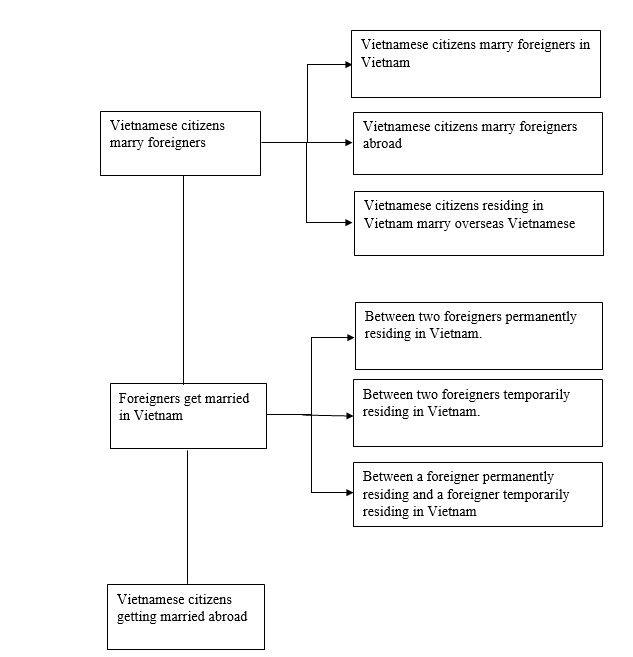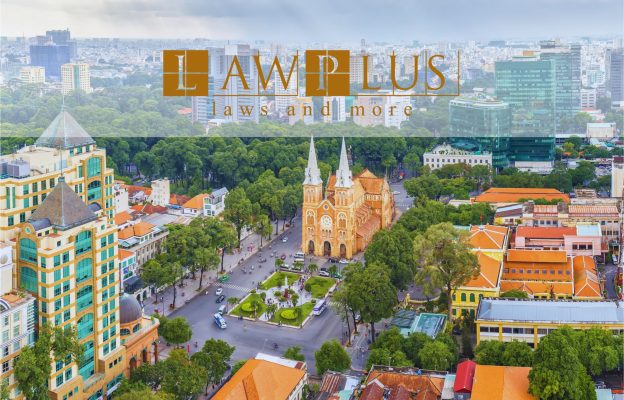Vietnam has been active in innovation strategy and international economic integration for the last 20 years. Nowadays, not only do the Vietnamese have many opportunities to live abroad, but.also the Vietnamese Government facilitates the residence of foreigners. Thus, marriage and family relations involving foreign elements become more popular than ever.
To help you better understand the regulations and procedures related to marriage relations involving foreign elements.Vietnam, Law Plus would like to present some main points of law.
Table of Contents/Mục lục
I. Marriage and family relations involving foreign elements
1. The concept of marriage and family relations involving foreign elements
Pursuant to Clause 25, Article 3 of the Law on Marriage and Family 2014:
“Marriage and family relation involving foreign elements means the marriage and family relation in which at least one partner.is a foreigner or an overseas Vietnamese or in which partners are Vietnamese citizens but the bases for establishing, changing or terminating that.relation are governed by a foreign law, or that relation arises abroad or the property related to that relation is located abroad’’.
Thus, marriage and family relationship involving foreign elements are marriage and family relations that satisfy one of these.following conditions:
a) The subject in the marriage and family relation is foreigner
According to Clause 1, Article 3 of the Law on entry, exit, transit and residence of foreigners in Vietnam 2014: “Foreigners are those.who carry papers proving their foreign nationalities, or those without nationalities who enter, leave, transit through, or reside in Vietnam’’.
According to Clause 5 Article 3 Consolidation Document 05/VBHN-VPQH 2014 integrating Law on Vietnamese nationality: ‘“Foreigners.residing in Vietnam” are foreign nationals and stateless persons who.permanently or temporarily reside in Vietnam’’.
Thus, marriage and family relations involving foreign elements may occur in the following cases:
(i) Between Vietnamese citizens and foreign nationals;
(ii) Between Vietnamese citizens and stateless persons;
(iii) Between foreign nationals permanently residing in Vietnam;
(iv) Between stateless persons permanently residing in Vietnam
b) The parties involved in the marriage and family relations resides abroad
The regulations of the Law on Marriage and Family 2014 also apply to marriage and family relations between Vietnamese citizens.where one or both parties reside abroad.
According to Clause 5 Article 3 Consolidation Document 05/VBHN-VPQH 2014 integrating Law on Vietnamese nationality: “‘Overseas Vietnamese” are Vietnamese citizens and persons of Vietnamese origin who permanently reside in foreign countries’’.
According to Clause 3 Article 3 Consolidation Document 05/VBHN-VPQH 2014 integrating Law on Vietnamese nationality: ““Persons of Vietnamese origin residing abroad” are Vietnamese people who used to have Vietnamese nationality which had been.determined at the time of their birth on the consanguinity principle and their offsprings and grandchildren are permanently residing.in foreign countries’’.
c) A legal event giving rise to, changing or terminating the marriage and family relations occurs abroad
(i) A legal event giving rise to the marriage and family relations occurs abroad
For example, the Vietnamese getting married at a foreign competent authority: The law applied to resolve relevant.legal issues such as determining the marriage conditions and marriage rites of the parties will be Vietnamese and foreign laws, except for international.treaties.of which Vietnam is a member and has different regulations. Here, the issue of choice of law will be raised.
(ii) A legal event changing the marriage and family relations occurs abroad
For example, legal separation is the legal event that changes the marriage relations abroad. According to this legal.separation, the marriage has not ended but the spousal relationship has changed. The personal and property relations of the spouses express this.change. The court order will then be governed by the court’s orders. Thus, when a legal event that changes the marriage relationship occurs abroad, the.law of that country and the law of Vietnam may be applied to consider the legal status of the spouses.
(iii) A legal event terminating the marriage and family relations occurs abroad
For example, when a spouse files a legal petition asking the foreign court to terminate the marriage, the applicable law is.Vietnamese law and the law of the place where the divorce is conducted. At that time, there will be conflict of laws and the choice of law will also.be raised.
d) Property related to marriage and family relations abroad
If a marriage and family relations involve overseas property, the choice of law will also be raised.
For example, a Vietnamese married couple residing in Vietnam but possesses an overseas immovable property. Which law will regulate the property relation of this married couple? The law of the country where such.immovable property is located or Vietnamese law? To solve this problem, it is common to apply the Choice of law rule. Accordingly, the law of the country where such.immovable property is located (lex rei sitae) will be applied to govern matters related to immovable property .
2. Application of laws
According to Article 122 of the Law on Marriage and Family 2014, Application of laws to marriage and family relations.involving foreign elements is:
– Unless otherwise provided by this Law, the legal provisions of the Socialist Republic of Vietnam concerning marriage.and family are applicable to marriage and family relations involving foreign elements. In case a treaty to which the Socialist Republic of Vietnam.is a contracting party contains provisions different from those of Law on Marriage and.Family 2014, the provisions of such treaty prevail.
– In case this Law and other legal documents of Vietnam refer to the application of a foreign law, such foreign law.shall apply, provided such application does not contravene the fundamental principles laid down in Article 2 of Law on Marriage and Family 2014. In case a foreign law refers back to the Vietnamese law, Vietnam’s marriage.and family law shall apply.
– In case a treaty to which the Socialist Republic of Vietnam is a contracting party refers to the.application of a foreign law, such foreign law shall apply.
3. Competence to settle cases and matters
According to Article 123 of the 2014 Law on Marriage and Family:
– The competence to register civil status related to marriage and family relations involving foreign.elements must comply with the law on civil status.
– The competence to settle cases and matters of marriage and family involving foreign elements at court.must comply with the Civil Procedure Code.
– District-level People’s Courts of localities where Vietnamese citizens reside are competent to cancel illegal.marriages, settle divorce cases, disputes over the rights and obligations of husband and wife, parents and children, recognition of parents, children, child adoption.and guardianship between Vietnamese citizens residing in border areas and citizens of neighbouring countries living in areas bordering on Vietnam.in accordance with Law on Marriage and Family and other Vietnamese laws.

4. Consular legalisation of papers and documents on marriage and family
According to Article 124 of the 2014 Law on Marriage and Family:
Papers established, granted or certified by competent foreign agencies for use in the settlement of cases and matters.of marriage and family shall be consular legalised, except cases eligible for exemption from consular legalisation under treaties to which the Socialist.Republic of Vietnam is a contracting party or on the principle of reciprocity.
II. Marriage involving foreign elements
1. The concept of Marriage involving foreign elements
The Law on Marriage and Family 2014 does not state the concept of “marriage involving foreign elements”, but pursuant to.the concept of “marriage and family relations involving foreign elements” mentioned above, marriage involving foreign element is the marriage in the.following cases:

2. Marriage conditions involving foreign elements
Each party must comply with the law of his or her own country regarding the marriage conditions. If the marriage is conducted.in Vietnam, the parties must comply with Law on Marriage and Family of Vietnam regarding marriage conditions.
According to Article 126 of the Law on Marriage and Family 2014:
– For marriages between Vietnamese citizens and foreigners, each party shall comply with his/her country’s law on marriage.conditions; if their marriage is conducted at a competent Vietnamese state agency, the foreigner shall also comply with Law on Marriage and Family.2014 ’s provisions on marriage conditions.
– Marriages between foreigners permanently residing in Vietnam at competent Vietnamese agencies must comply with.this Law’s provisions on marriage conditions.
According to Article 8 of the Law on Marriage and Family 2014, a man and a woman wishing to marry each other must.satisfy the following conditions:
(i) The man is full 20 years or older, the woman is full 18 years or older;
(ii) The marriage is voluntarily decided by the man and woman;
(iii) The man and woman do not lose the civil act capacity;
(iv) The marriage does not fall into one of the cases prescribed at Points a, b, c and d, Clause 2, Article 5 of this Law on Marriage and Family 2014 which are:
- Sham marriage or sham divorce;
- Underage marriage, forcing a person into marriage, deceiving a person into marriage, obstructing marriage;
- A married person getting married to or cohabitating as husband and wife with another person, or an unmarried person.getting married to or cohabitating as husband and wife with a married person;
- Getting married or cohabitating as husband and wife between people of the same direct blood line; relatives within three.generations; adoptive parent and adopted child; or former adoptive parent and adopted child, father-in-law and daughter-in-law, mother-in-law and son-in-law, or stepparent and stepchild;
– Vietnam shall not recognize marriage between persons of the same sex.
3. Order and procedures for marriage registration involving foreign elements
Pursuant to Section 2 of the 2014 Civil Status Law, Article 10 of Decree No. 123/2015/ND-CP, Section 2 of Circular No. 04/2020/TT-BTP, marriage registration procedures involving foreign elements are carried out. as follows:
Step 1:
Applicants for marriage registration shall submit a set of marriage registration documents directly at the Committee.Division of Justice , if the marriage is registered in Vietnam or the representative body, if the marriage is registered at the representative body. The dossier.consist of:
a) Application forms for marriage registration using the form as prescribed in Decree No. 123/2015/ND-CP;
b) a written certification of a competent Vietnamese or foreign health organisation stating that he/she does not suffer any mental or other diseases which deprive him/her of the ability to perceive and control his/her acts to the civil status registration agency.
c) A document certifying marital status of a foreigner is a document which is issued by a foreign competent.authority, remains valid, and certifies that the holder is being single. If the foreign country does not issue a document certifying marital status, an equivalent.document issued by the foreign competent authority certifying the holder’s eligibility for marriage as prescribed in.law of such country is required.
d) Copy of passport/passport replacement document.
Note: In addition to the above documents, depending on the case, the parties must submit or present the following corresponding documents:
– if the partner being Vietnamese citizen obtained divorce or granted marriage annulment at a the foreign.competent authority, he/she shall also submit a copy of vital records about such divorce or marriage annulment.as prescribed in Decree No. 123/2015/ND-CP
– if the partner being Vietnamese citizen is an official/public employee or an armed.force official, he/she shall also submit a document issued by the authority certifying that his/her marriage to the foreigner is conformable.with regulations of such sector.
– If the applicant for marriage registration has been going on business, studying, working under guest worker.program abroad, he/she must submit a certificate of marital status issued by the Vietnamese diplomatic missions, or consular agents.overseas (hereinafter referred to as representative body).
Step 2:
The officer receiving the dossier shall check the documents in it. If the dossier is complete and valid, the officer shall.write a receipt, specify the date of receiving the application and return the results. If the dossier is incomplete or invalid, the officer shall guide the applicant.to supplement. The instructions must be documented, which clearly and fully states the types of documents that need.supplementing. Then, the officer shall sign, clearly write his/her full name and hand it over to the applicant;
Step 3:
Within 10 – 15 working days from the date of receipt of complete and valid dossiers, the Committee Division.of Justice shall conduct research, verify the dossiers. The Head of the Committee Division of Justice is responsible for the examination results and gives his.opinions in order to handle the marriage registration dossier. If the marriage conditions are satisfied, the Committee Division of Justice shall request the.President of People’s Committee of district to sign 2 originals of marriage certificates.
Step 4:
When applying for marriage registration ,both parties shall present at the headquarters of the People’s Committee. The civil status official.shall asks both parties whether they voluntarily marry. If the answer is ‘yes’, the official shall documented marriage in the.vital records and two both parties sign it. Then the applicants shall sign the marriage certificates.
Within 3 working days from the date on which the President of People’s Committee of district signs marriage.certificates, Committee Division of Justice shall grant marriage certificates to the partners in person.
III. Divorce involving foreign elements
1. The concept of Divorce involving foreign elements
According to Article 127 of the 2014 Law on Marriage and Family:
– Divorce between a Vietnamese citizen and a foreigner or between two foreigners permanently residing in.Vietnam shall be settled at a competent Vietnamese agency in accordance with this Law.
– In case a partner being a Vietnamese citizen does not permanently reside in Vietnam at the time of.request for divorce, the divorce shall be settled in accordance with the law of the country where the husband and wife.permanently co-reside; if they do not have a place of permanent co-residence, the Vietnamese law shall apply.
– The settlement of a divorced couple’s immovables in a foreign country must comply with the law of the.country where such immovables are located.

Thus, divorce involving foreign elements is a divorce between Vietnamese citizens and foreigners, and between.foreigners permanently residing in Vietnam, which is resolved at a competent Vietnamese authority in accordance with Law on Marriage.and Family 2014; between a Vietnamese citizen and a foreigner; between Vietnamese people but the bases for establishing, changing or terminating.that relation arise abroad or assets related to such relationship abroad.
2. Competence to settle divorce involving foreign elements
a) Competence to settle an divorce involving foreign elements with mutual consent
The divorce with mutual consent is that the two parties have agreed on the division or non-division of community.property, the duty of care, nurture, and education of their children. According to Articles 35, 36 and 37 of Code of the Civil Procedure 2015, the jurisdiction to settle divorces involving foreign elements falls under the jurisdiction of People’s Courts of provinces. If in divorce process, one is in Vietnam and the other is abroad, the person who is abroad does not need to return to Vietnam to carry out the procedures.
b) Competence to settle unilateral divorce involving foreign elements
Unilateral divorce means one spouse decides to terminate the marriage without the consent of the other. The competence to.settle a divorce involving foreign elements is determined as follows:
– To the territorial jurisdiction of courts, according to the provisions of Article 39 of the Civil Procedure Code 2015, The Courts.of the localities where the defendants reside or work has jurisdiction to settle the divorce.
– If the plaintiff does not know where the defendant resides or works or where his/her head-office is located, the plaintiff may.petition the Courts of the area where the defendant last resides or works or where the head-office of the defendant is last located or where the defendant’ properties are located to settle the case;
– If the defendant does not have residence place, workplace or head-office in Vietnam or the case is related to disputes over.alimonies, the plaintiff may petition the Court of the area where he/she resides or works to settle the case;
3. Order and procedures for divorce involving foreign elements
Step 1:
The person applying for a divorce writes a divorce application and sends it to the competent Court for settlement. A divorce.application involving foreign elements includes the following documents:
a) An application for divorce.
b) A copy of ID card or personal identification paper (Passport, IDcard); Household book (a certified copy);
c) The original marriage certificate, in case the original marriage certificate is lost, a copy certified by a competent state agency.must be submitted and clearly stated in the petition;
d) A copy of the birth certificate (if there are children);
e) Copies of vouchers and documents on property ownership (if there is a dispute);
f) If the two parties get married in Vietnam, and then the spouse exits of Vietnam (the address cannot be found), there must.be a local authority’s certification that one of the parties has exited;
If the two parties who have registered their marriage under foreign law want to get a divorce in Vietnam, they must have the.marriage registration certificate legalised by a consular officer. Then, two parties shall carry out the procedures for noting them in the register book at the Committee Division of Justice before applying for a divorce. In case the parties do not make notes but still want a divorce, the divorce application must clearly state the reason for not making a marriage note.
Step 2:
The court accepts the application, considers its competence and legitimacy then issues a notice of the court fee advance.to the applicant. The applicant shall pay the court fee advance and return the receipt to the Court. The court accepts the divorce case and issues a.notice of acceptance of the case to the procuracies of the same level and the defendant (related persons).
Step 3:
The court handles the case according to legal procedures.
Note: The law does not require the divorce petition to go through mediation at the grassroots (People’s Committee.of ward, commune and agency’s trade union, …). However, in practice, many courts still required to have this mediation step.
IV. Identification of parents and children involving foreign elements
According to Article 128 of the 2014 Law on Marriage and Family:
– Vietnamese civil status registration agencies are competent to settle the identification of parents and children without.any disputes between Vietnamese citizens and foreigners or between Vietnamese citizens at least one of whom settles abroad, or between foreigners at least one of whom permanently resides in Vietnam in accordance with the law on civil status.
– Competent Vietnamese courts shall settle the identification of parents and children involving foreign elements in the.cases prescribed in Clause 2 of Article 88, Articles 89, Article 90, Clauses 1 and 5 of Article 97, Clauses 3 and 5 of Article 98, and Article 99 of Law on.Marriage and Family; and other cases involving disputes.
V. Support obligation involving foreign elements
According to Article 129 of the 2014 Law on Marriage and Family:
The support obligation must comply with the law of the country where the requester for support resides. In case the requester.for support has no place of residence in Vietnam, the law of the country of his/her citizenship shall apply.
Agencies competent to settle written requests for support of the persons prescribed in Clause 1 of this Article are agencies of.the country of residence of the requester. ‘
Application of the agreed matrimonial property regime; settlement of consequences of the co-living of men and women as.husband and wife without marriage registration involving foreign elements
VI. Application of the agreed matrimonial property regime; settlement of consequences of the co-living of men and women as husband and wife without marriage registration involving foreign elements
According to Article 130 of the 2014 Law on Marriage and Family:
In case of receiving requests for settlement of the application of the agreed matrimonial property regime; or relations of men.and women co-living as husband and wife without marriage registration involving foreign elements, competent Vietnamese agencies shall apply the.provisions of this Law and other relevant Vietnamese laws to settle these requests.
VII. Conclusion
Identification of parents and children involving foreign elements, support obligation involving foreign elements, settlement.of consequences of the co-living of men and women will be presented in another article in more detail. Please follow LawPlus’s website to.get the most up-to-date information.
This is the analytical essay of LawPlus about Vietnam’s regulations on marriage and family relations involving.foreign elements. Law Plus’s professional and experienced lawyers are always ready to offer you the best legal assistance in marriage problem. To receive the most timely, quality, effective and cost-effective.advice, please contact LawPlus via hotline +84 2862 779 399, +84 3939 30 522 or email info@lawplus. VN.
>>> Regulation on mutual consent divorce











